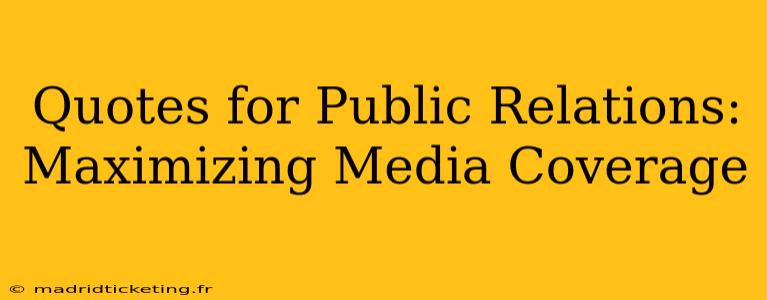Public relations (PR) is all about building and maintaining a positive image for your brand or organization. A key component of successful PR is securing media coverage—getting your message out to a wider audience through newspapers, magazines, television, radio, and online platforms. Crafting compelling quotes is a powerful tool in this process, offering concise, memorable soundbites that journalists can readily incorporate into their stories. This guide explores how to craft effective quotes for maximizing media coverage.
What Makes a Great PR Quote?
A strong PR quote is more than just a statement; it's a carefully constructed piece of communication designed to achieve specific goals. Key characteristics include:
- Clarity and Conciseness: Avoid jargon and overly complex sentences. Aim for short, impactful statements that are easily understood.
- Newsworthiness: The quote should offer fresh insights, perspectives, or information relevant to the current news cycle or the story's focus.
- Emotional Resonance: Tap into human emotions (hope, fear, excitement) to make the quote more memorable and engaging.
- Authenticity: The quote should reflect the speaker's genuine voice and personality. Avoid sounding scripted or inauthentic.
- Actionable Insights: Ideally, the quote should provide practical advice, solutions, or calls to action.
How to Craft Effective Quotes for Media Outreach
The process of crafting effective quotes starts long before you're actually speaking to a journalist. Here's a step-by-step guide:
-
Understand the Context: Before you even start brainstorming quotes, you need to deeply understand the story's angle and the target audience. What is the journalist trying to achieve with their article? What are the key themes?
-
Identify Key Messages: What are the most important points you want to convey? Distill your key messages into concise, memorable statements.
-
Brainstorm Potential Quotes: Generate a variety of quotes, experimenting with different angles and tones. Consider quotes that offer:
- Statistics and data: "Our recent survey showed a 30% increase in customer satisfaction after implementing this new program."
- Expert opinions: "Based on my experience, this approach is the most effective way to address this issue."
- Anecdotal evidence: "One of our clients saw a dramatic improvement in their sales figures after adopting this strategy."
- Call to action: "We encourage everyone to visit our website to learn more about this important initiative."
-
Refine and Edit: Once you've brainstormed several potential quotes, carefully review and refine them. Ensure they are clear, concise, and impactful. Read them aloud to ensure they sound natural and authentic.
-
Practice Delivery: Rehearse your quotes beforehand. This will help you deliver them confidently and naturally when speaking to a journalist.
Common Mistakes to Avoid
- Overly long or rambling quotes: Keep your quotes concise and to the point.
- Jargon and technical terms: Use simple, everyday language.
- Generic or cliché statements: Offer unique insights and perspectives.
- Negative or controversial statements: Unless strategically necessary, avoid negativity.
- Unclear or ambiguous statements: Ensure your message is easily understood.
Maximizing Your Quotes' Impact
- Provide context: When giving a quote, make sure to provide some background information to help the journalist understand the context.
- Offer different angles: Prepare a range of quotes that address various aspects of the topic.
- Be prepared for follow-up questions: Anticipate questions a journalist might ask and prepare thoughtful answers.
- Build relationships with journalists: Networking and building rapport can significantly increase your chances of getting quoted.
Frequently Asked Questions
How can I make my quotes more memorable?
Use strong verbs, vivid imagery, and storytelling techniques to create memorable quotes. Consider incorporating a personal anecdote or a surprising statistic.
What is the best length for a PR quote?
Aim for quotes that are between one and three sentences. Shorter quotes are more likely to be used by journalists.
Should I always say "no comment"?
Generally, it's best to avoid "no comment" unless you have a very good reason. A well-crafted quote can be a valuable opportunity to shape the narrative.
How can I get more media coverage?
Develop a strong media relations strategy, build relationships with journalists, and proactively pitch stories to relevant media outlets.
By carefully crafting compelling quotes and strategically engaging with the media, you can significantly improve your chances of achieving widespread media coverage and strengthening your brand's reputation. Remember, a well-placed quote can be the key to conveying your message effectively and leaving a lasting impression on your audience.

